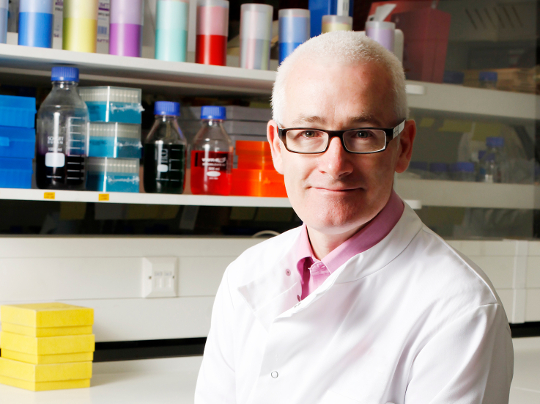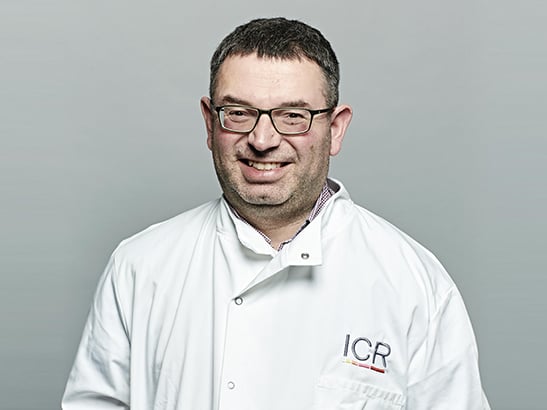-being-attacked-by-two-cytotoxic-t-cells---945x532.png?sfvrsn=671d5369_4)
Image: Pseudo-coloured scanning electron micrograph of an oral squamous cancer cell (white) being attacked by two cytotoxic T cells (red), part of a natural immune response. Image from NIH Image Gallery. Licensed under a Creative Commons CC-BY-NC 2.0 license
Immunotherapy is an exciting type of cancer treatment that harnesses our immune system to recognise and attack cancer cells, which often conceal themselves from the body’s natural defences. It is now being used to treat several cancers, including melanoma and lung cancer – but there is still much untapped potential.
Immunotherapy has been extremely successful for some patients. But the current generation of cancer immunotherapies only work in some cancers, and the mechanisms by which these treatments succeed – or not – still isn’t well understood. We also don't yet have good ways of judging who is most likely to respond, while the overall response rate to immunotherapy is low at around 15 per cent across all cancers.
Combination attack
Now, our researchers are learning much more about the biology of the immune system – and how to turn it against cancer. We are studying the different components of the immune system, including molecules which act as accelerators or brakes on the immune response. The next challenge is to convert this knowledge into a new generation of immunotherapies, or ways of making the current drugs work more effectively.
Our researchers are seeking to uncover strategies which lead to more effective, targeted use of immunotherapy. One key strategy which has emerged through research is to combine immunotherapies with other types of treatment, such as chemotherapy and radiotherapy, to improve their effectiveness.
For example, immune checkpoint inhibitors are a type of immunotherapy that block key immune-related proteins from binding. They can be combined with radiotherapy to trigger or promote an immune response against tumours, and have seen some clinical success.
Radiotherapy and immunotherapy combinations can also work for cancers that have become resistant to radiotherapy, just as they can be to drugs. This combination attack could make it harder for cancer cells to remain resistant, and lead to more effective treatment.
A study led by Dr Anguraj Sadanandam, who heads our Systems and Precision Cancer Medicine Team, suggested that bowel cancers that have become resistant to radiotherapy might be made susceptible again with targeted immunotherapy. Researchers believe these findings could also be relevant for other cancer types.
Using viruses to kill cancer

Image: Professor Kevin Harrington - Head of the Division of Radiotherapy and Imaging. He studies the use of biologically targeted agents, in combination with treatments such as radiotherapy and chemotherapy, to target cancer cells selectively.
We are starting to understand that immunotherapy drugs work best on tumours that have already had some immune response triggered against them. These are known as immunologically ‘hot’ tumours, while ‘cold’ tumours have stimulated little to no pre-existing immunity and generally respond poorly to immunotherapy drugs.
One way to turn cold tumours hot lies in a form of treatment that uses viruses to infect and kill cancer cells. These are known as oncolytic viruses, and they support another avenue of immune exploration – cancer vaccines.
In this approach, oncolytic viruses are used to kill cancer cells and release specific molecules called antigens – boosting an anti-cancer immune response at the same time as turning the tumours ‘hot’. Because of the specificity of this approach, oncolytic virus-induced cancer vaccination is effectively personalised to target a patient’s individual cancer.
Professor Kevin Harrington, Professor of Biological Cancer Therapies at the ICR, and Professor Alan Melcher, who leads our Translational Immunotherapy Team, are exploring how to use these modified oncolytic viruses to kill cancer cells and spark the immune system into action.
Professor Harrington says:
“Early evidence shows that oncolytic viruses could act as effective cancer vaccines against different cancer types, but we still don’t fully know how they work best in patients. We are working to understand the science behind these viruses that will allow us to design and run clinical trials ultimately to make these cancer vaccines a reality.”
Connected radiotherapy network

Image: Radiotherapy machine at The Royal Marsden (photo: Jan Chlebik/the ICR)
We are leading efforts to propel progress in immunotherapy research by tackling gaps in research. For example, in-depth investigation is currently lacking when it comes to the biology of the immune response to radiotherapy in patients, treatments and clinical trials – something that is needed to inform and direct future studies into radiotherapy/immunotherapy combinations.
To address these questions, the ICR is leading a new pathology network studying the immune effects of radiotherapy within the Cancer Research UK-funded RadNet – a major radiotherapy hub that connects seven UK centres, including the ICR and The Royal Marsden, to optimise radiotherapy through innovative research.
Find out more about the Radiation Research Centre of Excellence (RadNet) at the ICR and The Royal Marsden.
Learn more about the RadNet centre
The new immune pathology network, named RadPath, sets up the infrastructure to analyse the immune micro-environment of tumour samples from patients in ongoing trials that include radiotherapy..
A new vision for immunology

Image: Professor Alan Melcher is the Lead of the Centre for Translational Immunotherapy
As research into the immunology of different cancer treatments becomes increasingly active, we are also connecting wider research teams working in this area through our Centre for Translational Immunotherapy (CTI), led by Professor Melcher and The Royal Marsden’s Dr Andrew Furness, and supported by a major donation from the CRIS Cancer Foundation.
The CTI brings together researchers to share their expertise, while inspiring ideas and fostering collaboration. New research is under way across cancer types and disciplines to explore a range of treatment combinations.
This is possible through funding that supports collaborative networks including the CTI, RadNet and our Integrated Pathology Unit, which uses digital pathology to transform how we understand and diagnose cancer.
Professor Melcher says:
“Immunotherapy is extending well beyond where it first started in the treatment of melanoma, as we’re recognising it can help in an increasing number of fields of cancer research. Valuable conversations and collaborations are building around networks such as the CTI, and I’m very excited about the attention they are generating both within the ICR and further afield.”
Making immunotherapy work better, and for more people with cancer, is a vital objective – and one our researchers are determined to meet. With their efforts, we can expect a brighter future for immunotherapy, and for cancer patients.
Our research is already helping patients live longer and live well with cancer. But cancer is clever and can adapt and evolve to evade treatment, so we are looking for new ways to stay one-step-ahead and outsmart cancer. Using treatments in combination is one way of doing this. Please support our research to unlock new combination therapies, so more people will survive cancer.
Let’s finish cancer, together.
Donate today

 .
.